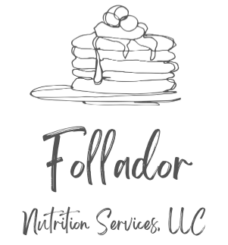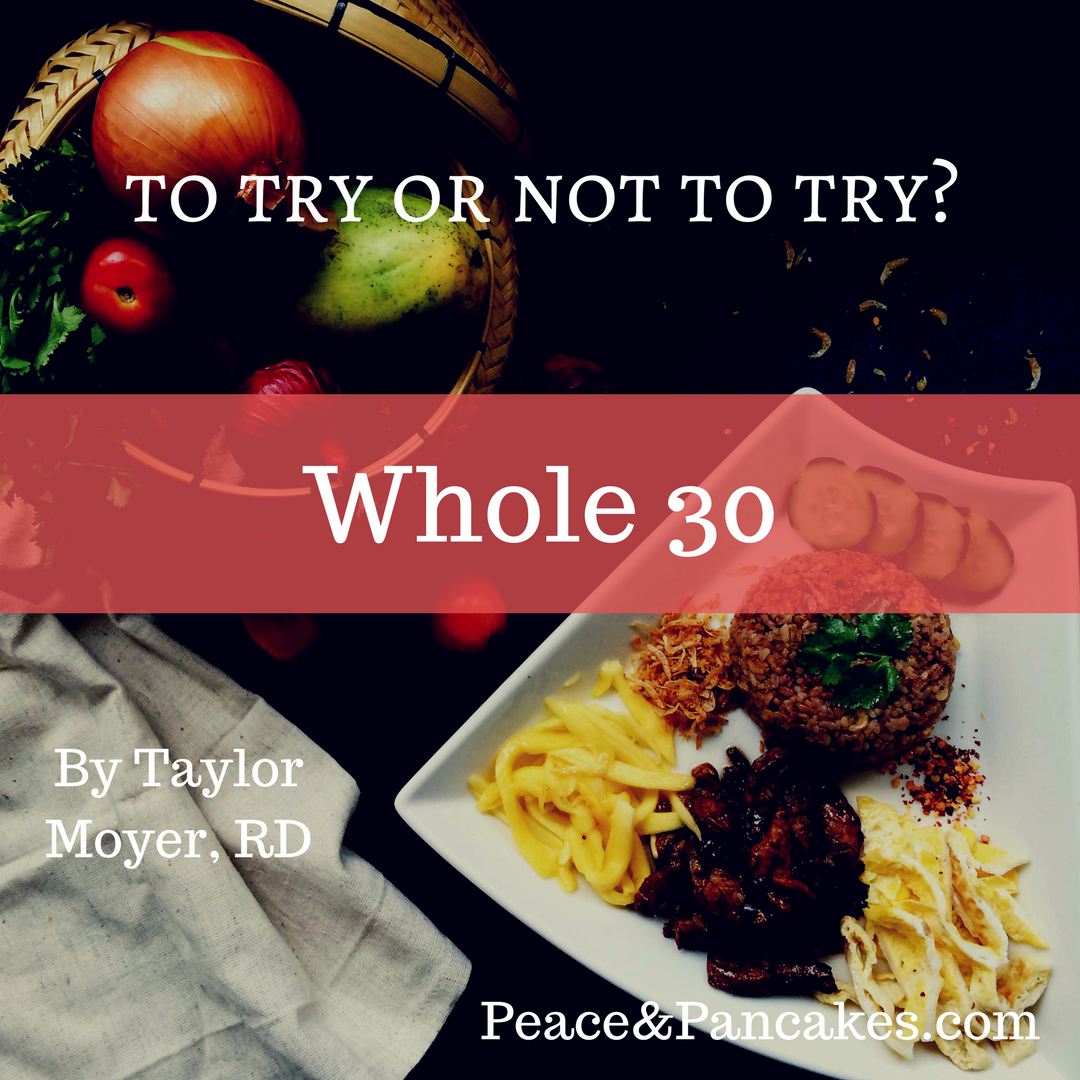This post is part of the “To Try or Not to Try” blog series. Written by a registered dietitian (RD) or dietetic intern, each post explores the claims and science surrounding a different dietary pattern or trend. After compiling this research, each RD or RD2be gave the diet a grade based on whether it appears to hold up to the hype. A = “yes, go for it!” and F = “no way, absolutely not!”
About the Author:

Taylor is a dietitian who currently works in eating disorder recovery in Austin, TX. After receiving her undergrad at Penn State, Taylor accepted a dietetic internship through Texas State, where she primarily focused on pediatric nutrition. During the year-long internship, she came across her passion for eating disorder recovery and quickly found a job that allowed her to dive into that specialized practice. Now, she has the pleasure of working with a diverse population and giving them the tools to truly develop a healthy relationship with food.
What is Whole30 recommended for?
According to proponents of the diet, Whole30 Is meant to be a diet reset button that gives the public an opportunity to develop a healthy relationship with food, particularly for those who are lethargic, interested in weight loss, and/or experience inflammation of some sort (i.e., joint pain, allergies, digestive complications).
The diet itself is meant to last 30 days. After this time, excluded foods are added back into the diet gradually. The key is to listen to your body and notice if certain foods cause any irritation or discomfort. If any of the reintroduced foods cause distress, they are to be omitted from the diet permanently.
What foods are allowed?
Only whole, minimally processed foods are included in this diet. Excluded are the following: grains, legumes, dairy, soy, sugars/sweeteners, MSG, and alcohol. Whole9 (the diet Whole30 originated from) states that there is significant research for why these foods should be omitted, such as that dairy and soy’s hormone content puts unwanted stress on the body. Whole9 blatantly remarks grains and legumes as “less healthy” than fruits and vegetables, partially because these carbohydrate sources contain phytates, which inhibit nutrient absorption. While phytates may inhibit absorption of certain nutrients (such as iron) that does not necessarily mean grains and legumes should be avoided altogether. Whole9 also states sugar is addictive and only provides empty calories. In reality, sugar is what gives the body energy.
What is the overall nutrient composition?
While Whole30 doesn’t exclusively discuss macronutrient distribution, it does emphasize protein and healthy fat consumption. By excluding dairy, grains, legumes, and sugar, the only significant source of carbohydrate left is fruit, which Whole30 recommends only having two servings of per day. This limitation severely impacts carbohydrate intake, forcing the body to rely on protein and fat for most of its energy.
Consuming trace amounts of carbohydrates is not ideal, as carbs are the body’s primary source of energy. The brain particularly relies on carbs more than any other nutrient to function. Without this crucial macronutrient, the body becomes lethargic. It isn’t until the body gets used to the high protein and fat intake that it begins to function normally again. This is during the point where many Whole30-ers apparently experience a “mental high.”
Are the claims about Whole30 supported by science?
If done correctly, people who do Whole30 are said to have more energy, less pain, lose weight, and be happier overall. However, it is unclear how Whole30 is making these claims, as there is no concrete scientific evidence that these claims are 100% true. Whole30 has conveniently done all the research and found it does help with all the ailments previously listed; where this research can be found is the question.
Who should definitely not try Whole30?
- Vegetarians and vegans. Due to the restrictions of high-protein plant-based foods, this population may become malnourished and develop micronutrient deficiencies. Because grains, legumes, soy, and dairy are off the table, the only protein-containing foods remaining are eggs (which vegans don’t eat) and nuts (not including peanuts).
- People with diabetes. Limiting fruit consumption and restricting grains altogether can be dangerous for those with diabetes. With a severe dent in carb options, blood sugars can drop significantly, leading to a slew of symptoms, such as confusion, blurred vision, headaches, etc.
- Those who are recommended by a doctor or dietitian to have a high fiber diet. Grains are a major source of fiber. Restricting this food group can lead to bowel distress and constipation.
Is Whole30 realistic and sustainable?
Ultimately, this diet is doable for some, and unrealistic for most. People live busy lives. Between work, school, friends, and extracurriculars, it is difficult to find time to follow any diet, let alone Whole30. Whole30 is the boot camp of diets; there is no room for slip-ups and cheat days. Just one bite of a cookie will set you back to Day 1.
What are the overall pros and cons of Whole30?
Below are the three things that I can agree with Whole30 on:
- Whole30 aims to help you rebuild that healthy relationship with food that you lost as a child. Start to enjoy good, nourishing food again. Avoid the food that makes you feel tired and crappy. Figure out which foods your body prefers, which can improve your mood and attitude towards food.
- During the program, stepping on the scale is discouraged. A number should not dictate your life. Food choices shouldn’t be based on how much weight it will make you gain, but on whether or not you enjoy it and if your body needs nourishment.
- Lastly, there is no calorie counting, no point system, and no logging of meals, which allows you to be less obsessive about what you’re eating. Eating is meant to be a mindful, nourishing experience, not a math problem.
On the other hand…
- Whole30 has the potential to lead to micronutrient deficiencies. Carbs are a significant source of the B vitamins, so without this macronutrient, it is difficult to be sufficient in this vitamin. B vitamins are important players in metabolism and the production of healthy red blood cells. Depression, anemia, skin inflammation, and memory loss can result from a deficiency in B vitamins. With the restriction on dairy comes a chance of vitamin D or calcium deficiency, which can lead to poor bone health.
- Whole30 omits whole food groups. Along with creating unbalanced eating and increasing chances of developing deficiencies, this promotes a good vs. bad food mentality. This mindset can lead to disordered eating. It’s important to remember that all foods have a purpose and provide nourishment in some form.
- Whole30 is an extremely strict diet that gives a lot of tough love. According to Whole30, one small slip up is grounds for failure, while there is no such thing as a “slip up” in healthy eating. Food rules only cause us to feel shame around what we eat. It’s perfectly acceptable to eat a slice (or two) of cake on your birthday (or any day).
- Ultimately, there is no research on the claims that Whole30 is making. Is it possible that removing whole food groups can decrease inflammation? Yes. Is it possible that this can also increase the risk for osteoporosis and gastroparesis? Yes. There is not significant research leading us to the conclusion that Whole30 is the answer to all our problems.
What grade do you give Whole30?
C. While Whole30 is a huge proponent of building a healthy relationship with food, it’s going about it in an unhealthy way. A strict elimination diet is not the way to start accepting food again. Not only that, but Whole30 is not a wholesome diet. Cutting out carbs and restricting multiple food groups can be dangerous under certain circumstances. There is a more effective, safer way to develop healthy eating habits. While the right intention is there, the method is completely wrong.
What is your general recommendation for a healthy eating pattern for the average human?
Listen to your body. It is important to understand how your body responds to food. Eat when you are hungry and stop when you are full. Eat what you enjoy and what satisfies you. Of course, this is all easier said than done. We live in a diet culture, so it is easy to get caught up in the diet fads that are always popping up on our screens. Society has taught us that we need to be skinny and fit to be loved. Screw that. Be yourself, and you will still be loved. Eat what you want and be aware of what your body is asking for. Some days, it may be that second cookie and other days, it may be some broccoli.
DISCLAIMER:
This content is intended for informational and educational purposes only. It is not intended as medical advice, medical nutrition therapy, or individualized nutrition counseling. Talk to your doctor or another licensed healthcare practitioner before making any changes to your diet, medications, or exercise routine. The opinions of these authors are their own and are not approved, sponsored, or endorsed by any professional organizations including but not limited to the Academy of Nutrition and Dietetics, United States Department of Agriculture, Food and Drug Administration, National Institutes of Health, American Heart Association, and American Diabetes Association.


WOW!!!! Very proud of you Taylor